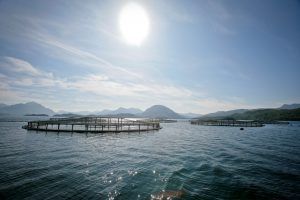
A Scottish consortium – CENSIS, marine technology provider OTAQ, the Iain Fraser Cytometry Centre (IFCC), and SAIC – is creating a low-cost sensor system that can automatically sample, identify, and count specific microscopic organisms using imaging analysis.
This project is expect to take a significant step towards the development of an early-warning detection system for potentially dangerous plankton and algae, which could help the global aquaculture industry tackle one of the biggest challenges to fish health and wellbeing.
Algae and plankton build-up is a major issue in aquaculture – some types of the organisms are toxic to salmon and others, in large quantities, can cause fatal gill damage. Algal blooms, the rapid growth of algae, can occur when there are significant changes to temperature, light, or nutrient conditions. In 2019, a particularly severe case in Norway led to the loss of a substantial number of fish.
Current methods used for monitoring plankton and algae numbers are laborious, relying on readings manually taken once or twice per day. The results are also open to individual interpretation and error. Even some of the more accurate approaches rely on expensive and high-maintenance equipment that only provide a snapshot of algal levels.
Using microscope camera technology and a unique water sampling tool, OTAQ’s new system will use AI deep learning to process images and provide a near real-time reading for fish farmers. The producers can then take preventative measures, such as the activation of a ‘bubble curtain’ or barrier to protect a stretch of water or stop feeding salmon when necessary.
The system is expected to enhance fish wellbeing and better safeguard stocks, improve the use of feed, as well as helping to make the entire water quality monitoring process more efficient and cost effective for producers. OTAQ said several companies have already expressed an interest in the new technology.